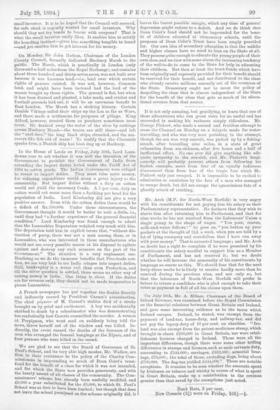In the House of Lords on Friday, July 20th, Lord
Lans- downe rose to ask whether it was still the intention of the Government to prohibit the Government of India from .extending the import duties levied under the Tariff Act of 1894 to cotton goods. The Indian Government were obliged to revert to import duties. They must, raise more money, for reducing expenditure would mean a great injury to the community. But import duties without a duty on cotton would not yield the necessary funds. A 5 per cent, duty on cotton would not mean more than a farthing per head for the population of India. Lord Kimberley did not give a very positive answer. Even with the cotton duties there would be A deficit of Rx.300,000. Under these circumstances, the Government thought it would be better to wait a little, i.e., until they had " a further experience of the general financial condition." Lord Kimberley was frank enough to admit that the Lancashire Deputation weighed very much with him. 'The deputation told him in explicit terms that, "without dis- tinction of party, there was not a man among them, or in Lancashire, who was interested in these manufactures who would not use every possible means at his disposal to agitate against and destroy any such measure on the part of the Government." The situation • is a very unpleasant one. Realising as we do the immense benefits that Free-trade con- fers, we are very loth to see India relapse into import duties. -Still, bankruptcy is a worse evil than even Protection, and till the silver question is settled, there seems no other way of raising money in India. One thing is clear. If the duties are for revenue only, they should not be made inoperative to please Lancashire.


































 Previous page
Previous page